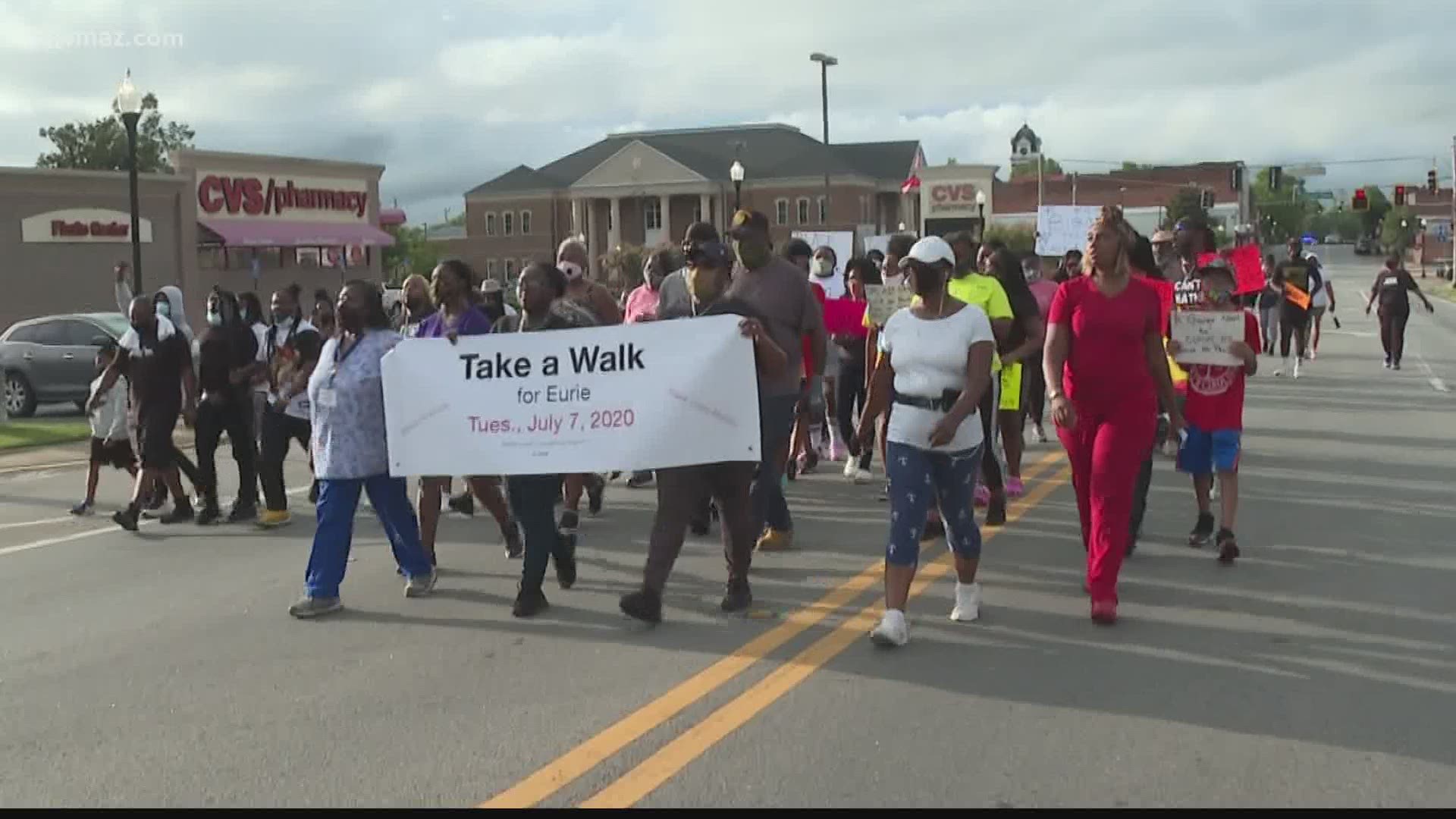SANDERSVILLE, Ga. — Editor's Note: The video in this story is from a July 2020 event held to remember Eurie Martin.
Were three former Washington County deputies defending themselves when they tased and killed a 58-year-old man...or were they the aggressors?
Did a judge rule properly when he threw out murder charges against the three last year... or should a jury get to decide?
Lawyers will debate those questions Thursday when the Georgia Supreme Court hears arguments over the 2017 death of Eurie Martin.
The case focuses on an issue central to this summer’s protests against police violence — qualified immunity.
That’s the principle that shields police from lawsuits or criminal charges except for cases involving extreme misconduct.
Reacting to the death of George Floyd in Minneapolis and other high-profile cases, some states have eliminated or restricted police immunity.
CBS reported that one of those happened in Coffee County, Georgia, where a deputy accidentally shot an unarmed 10-year-old boy while chasing a suspect through the boy's backyard.
A federal appeals court threw out a lawsuit against Officer Michael Vickers, and the Supreme Court sided with the officer.
Now, the Georgia Supreme Court will hear arguments on whether criminal charges should be reinstated against former Washington County deputies Henry Lee Copeland, Michael Howell and Rhett Scott.
Defense lawyers argue that the tasing was justified because the officers were defending themselves.
But according to a judge’s order in the case, witnesses say Martin never threatened or attacked the officers and walked away several times.
According to briefs filed in the case, Washington County prosecutors plan to argue that Martin posed no threat to Copeland, Howell and Scott.
They also argue that Judge H. Gibb Flanders was wrong when he threw out all the charges against the three.
The Georgia General Assembly intended for that qualified immunity to be a defense at trial, but not cause to throw out the charges altogether before trial, prosecutors write.
They say a jury in Washington County should have decided whether that immunity defense was justified.
'Reasonably necessary under the circumstances'
13WMAZ has been covering this case since July 2017, when Martin died after being tased on Deepstep Road in Sandersville.
Copeland, Howell and Scott claimed they tased Martin because he fought with them. A bystander sent video to 13WMAZ that showed that was not true.
Martin, who was 58, died on the scene.
Washington County Sheriff Thomas Smith, who died in 2019, fired the deputies for violating department policies.
The case has sparked protests and marches in Sandersville. The officers were fired and grand juries have indicted them twice.
Last November, Flanders threw out the charges again.
"Defendants have shown by a preponderance of the evidence that they were justified in their actions, based on a reasonable belief that the force used in the seizure and arrest of Mr. Martin was reasonably necessary under the circumstances," he said.
But his order raised many more questions about the case.
He wrote, for example, that the deputies didn't know the department's tasing policy, didn't understand the health risks of tasing and didn't realize that Martin was mentally ill.
Flanders also noted several times that the suspect was not violent or aggressive toward the deputies.
Despite that, the officers used deadly force on a man suspected of minor crimes like loitering, walking on the highway and obstructing an officer -- a misdemeanor.
A Washington County prosecutor's brief appealing the case says Flanders' order never considered whether the officers acted in self-defense or whether they were justified in arresting Martin.
It notes that Howell's first words upon arriving at the scene and stepping out of the cruiser were, "Tase his ass."
Prosecutor Kelly Weathers also wrote that a jury might find that "Howell provoked Martin to use force...without success, having been snubbed by Martin's refusal to answer the officer's questions and Martin's insistence on walking away from the encounter."
Weathers wrote, "The death of Eurie Martin, an unarmed, mentally ill man who tried to walk away from a citizen-police encounter where the state cannot discern a crime committed by Martin, has shaken our community's faith..."
'Shoot first, think later'
A string of violent deaths of suspects killed by police this year put the issue of qualified immunity back in the spotlight.
When the U.S. Supreme Court declined to take up the issue this spring, CBS reported that both conservative and liberal justices had expressed concerns while writing about past cases.
Three years ago, Clarence Thomas, one of the most conservative justices, wrote, "I continue to have strong doubts" about qualified immunity, saying the policy had strayed too far.
And one of the more liberal judges, Sonia Sotomayor, wrote that a qualified-immunity ruling "tells officers that they can shoot first and think later," and that police misconduct "will go unpunished."
The federal judge said he had no choice, due to precedents set under previous qualified-immunity rulings, but Judge Carlton Reeves said the U.S. Supreme Court should end the practice.
He wrote, “Over the decades, however, judges have invented a legal doctrine to protect law enforcement officers from having to face any consequences for wrongdoing. The doctrine is called ‘qualified immunity.’ In real life it operates like absolute immunity.”
Thursday's hearing begins at 10 a.m. and the Georgia Supreme Court will live stream the arguments on the Martin case and others via Zoom.

